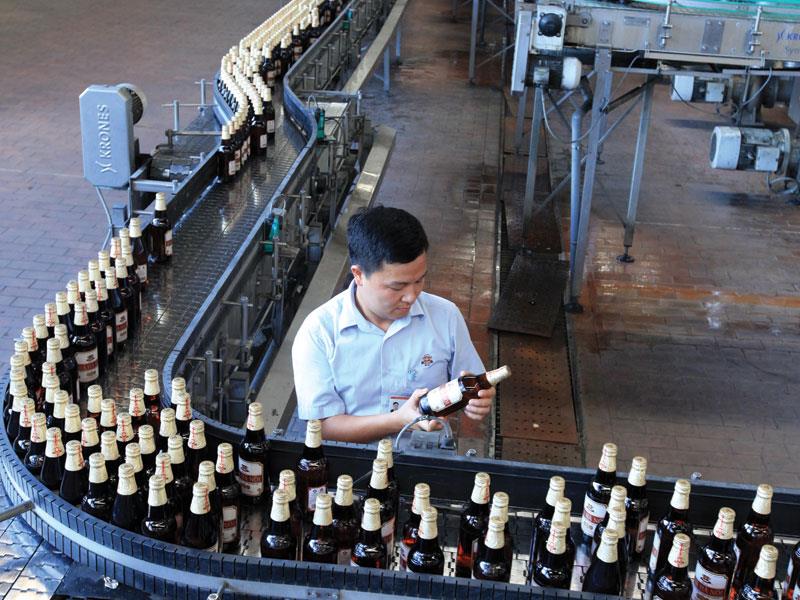Carlsberg breaks promise as strategic partner : Habeco general director

Habeco general director Nguyen Hong Linh showed disappointment in the partnership at the December 24 conference on the restructuring and equitisation of, and state divestment from companies under the Ministry of Industry and Trade (MoIT).
According to Linh, Carlsberg failed to help Habeco train its human resources, modernise its technology and equipment, expand market, and improve governance as promised. Instead Carlsberg, having been present on Habeco’s board of directors since 2008, is now privy to all of Habeco’s trade secrets, from growth strategy to distribution methods.
“Choosing Carlsberg as a strategic partner has not brought any benefit to Habeco,” Linh concluded, adding that this should be a lesson for other companies, especially the five biggest companies under the MoIT that are going to be equitised in the 2016-2020 period (Vietnam Electricity (EVN), Vietnam National Oil and Gas Group (PVN), Vietnam National Coal-Mineral Industries Holding Corporation Limited (TKV), Vietnam National Chemical Group (Vinachem), and Vietnam National Petroleum Group (Petrolimex)), when picking a strategic partner.
Linh is now requesting the MoIT for guidance on how to solve the problem with Carlsberg and the very strict terms of their contract without harming other stakeholders in the company. Habeco suggested selling its shares in lots.
Minister of Industry and Trade Vu Huy Hoang said that in 2016 the ministry would call for investors to become strategic partners in equitised companies.
In 2008, Habeco sold a 17.23 per cent stake to Carlsberg. In 2012, Habeco requested its shareholders’ permission to sell a further 13 per cent stake owned by the state to Carlsberg, raising Carlsberg’s ownership to 30.23 per cent.
By the time of Habeco’s annual shareholder’s meeting in June 2015 the sale had not yet been finalised. The company’s leadership then attributed the delay to the failure of Carlsberg and the MoIT, the representative of the state’s stake in Habeco, to agree on some terms. Specifically, Carlsberg was asking for more extensive privileges than other shareholders, some of which did not even comply with Vietnamese laws and regulations.
The state is looking to sell 51 per cent or more of Saigon Beer-Alcohol-Beverage Joint Stock Corporation (Sabeco). Eight years after the equitisation started, the state is still holding 89.59 per cent in the company, having sold 5 per cent to Heineken and the rest to other shareholders.
Sabeco, which is currently holding a 46 per cent share of the Vietnamese beer market, exceeding Habeco’s 16 per cent by far, plans to pick one strategic investor in the beer industry and another in beverage and food. As of now, Dutch brewer Heineken, US brewer Annheuser-Busch, Belgian InBev, Thai ThaiBev, as well as Japanese Asahi have showed interest in Sabeco.
Sabeco has put forth a number of criteria for choosing its strategic partners, with some limitations applying to direct competitors. According to Phan Dang Tuat, former chairman of Sabeco, the company is going to have stricter contract terms for strategic partners in order not to follow in the footsteps of Habeco.
What the stars mean:
★ Poor ★ ★ Promising ★★★ Good ★★★★ Very good ★★★★★ Exceptional
Latest News
More News
- Vietnamese businesses diversify amid global trade shifts (February 03, 2026 | 17:18)
- Consumer finance sector posts sharp profit growth (February 03, 2026 | 13:05)
- Vietnam and US to launch sixth trade negotiation round (January 30, 2026 | 15:19)
- NAB Innovation Centre underscores Vietnam’s appeal for tech investment (January 30, 2026 | 11:16)
- Vietnam moves towards market-based fuel management with E10 rollout (January 30, 2026 | 11:10)
- Vietnam startup funding enters a period of capital reset (January 30, 2026 | 11:06)
- Vietnam strengthens public debt management with World Bank and IMF (January 30, 2026 | 11:00)
- PM inspects APEC 2027 project progress in An Giang province (January 29, 2026 | 09:00)
- Vietnam among the world’s top 15 trading nations (January 28, 2026 | 17:12)
- Vietnam accelerates preparations for arbitration centre linked to new financial hub (January 28, 2026 | 17:09)
















 Mobile Version
Mobile Version